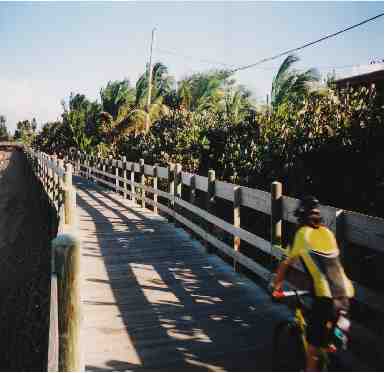U.S. Department of Transportation
Federal Highway Administration
1200 New Jersey Avenue, SE
Washington, DC 20590
202-366-4000
Puerto Rico and US Islands Division

Project Description
The Piñones Trail is an outstanding example of a non-motorized transportation project, which provides individual and family recreational activities while preserving the ecological value of the area. The project is located along the Route PR-187 corridor.
The trail is a multi-purpose facility, which integrates as a network, areas of ecological significance and breathtaking scenic beauty into a unique system of conservation, recreation, and educational value. The project provides facilities for pedestrians, and cyclists, observation towers, gazebos, an information center, parking areas, interpretative signing along the route and other facilities, all meeting the requirements of the American with Disabilities Act (ADA). The trail, about 11 kilometers long, was built at a cost of approximately $7 million and was inaugurated in January 2000. It was financed in part with $6.4 million in Transportation Enhancement Program Funds provided by Federal Highway Administration.
Social and Environmental Considerations
Because the trail is located in a very ecologically sensitive area, close coordination was required with all concerned state an federal agencies to ensure full compliance with applicable laws an regulations. The Puerto Rico Highway and Transportation Authority, and the Department of Natural and Environmental Resources (DNER), as co-sponsors of the project, worked hand-in-hand with the US Corps of Engineers in the identification and delineation of wetlands. The Coastal Zone Management Program of the DENR, the State Historic Preservation Office, the US Fish and Wildlife Service, the Institute of Puerto Rican Culture, and the Municipality of Loiza were also involved in the environmental process, all in a climate of partnership.
The project impacted approximately five acres of wetlands (mangrove and other species), along 3.5 kilometers of the trail. As a mitigation measure, 15 acres of mangrove were planted outside the project limits in an area designated for this purpose. Channels in the wetlands near the project, although not impacted by the project, were cleaned to provide a better visual impact and to improve the flow of water.
The section of the trail over wetlands was built on a boardwalk, with drainage pipes and gabions used to ensure tidal flow into the mangroves.
The original alignment of the trail was shifted to avoid known archaeological pre-Colombian sites in the Punta Maldonado area. No excavation was performed and no sites were disturbed to preserve their integrity and value.
An area of schoepfia arenaria, a threatened plant species, was also avoided. Restoration and landscaping was performed as part of the project utilizing native plants and shrubs removed during construction.
Known nesting areas of leatherback (Dermochelys coriacea), and hawksbill (eretmochelys imbricata), sea turtles were by-passed to avoid any impact upon these threatened and endangered species. Also no lighting was provided and use of the trail is prohibited at night to further protect these wonders of nature.
The Piñones area, a ward within the municipality of LoÃza, is one rich in history and tradition. Its early settlers were the different Indian Tribes, which inhabited the island. In the 1800's freed slaves populated the area. Present residents are primarily descendants of these cultures. Their views and inputs into the project concepts were considered early in the planning. Two public hearings were held in the La Torre and Piñones communities where the different alternatives and their impacts were discussed. The project has received the support of the community and elected local officials.
Since its opening in January 2000, the trail has been successful. Its use has created a "family-type" activity center. It is very common to see entire families enjoying biking, hiking or simply walking along, enjoying the cool ocean breeze, the scenic views and socializing with other users of the facility. The success of the Piñones trail has encouraged public officials to promote similar projects. Already several bicycle and pedestrian facilities are being considered around Puerto Rico.